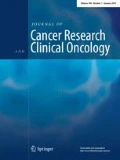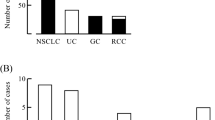Abstract
Purpose
The risk factors and clinical characteristics of ICI-induced immune-mediated hepatotoxicity (IMH) are not fully understood. Thus, the present study sought to clarify the clinical features of IMH.
Methods
All patients treated with ICIs between September 2014 and April 2019 at our institution were included. Clinical data were retrospectively collected from medical records. The frequency of grade ≥ 2 liver damage, clinical characteristics, and risk factors for developing IMH were examined.
Results
Overall, 250 patients (median age 71 years; range 30–87 years; 202 males and 48 females) were included in the analyses. Forty-five patients had elevated transaminase levels (> threefold the upper limit of normal). Of these, 21 were considered to have IMH. The remaining 24 patients had other causes of elevated transaminase levels. Steroids were administered to 13/21 patients with IMH. Although all patients exhibited improvement, IMH was not associated with the anticancer efficacy of the ICIs or OS. A multivariable analysis revealed that IMH was significantly associated with malignant melanoma (odds ratio [OR] 11.6; 95% confidence interval [CI] 3.5–38.0; P = 0.0002) and ipilimumab–nivolumab combination therapy (OR 61.2; 95% CI 7.9–1275.3; P < 0.0001).
Conclusion
Immune-mediated hepatotoxicity occurred in 9.5% of patients treated with ICIs. Appropriate therapeutic interventions are important to avoid affecting the patient’s prognosis, and accurate diagnosis of IMH is essential for this purpose. The frequency of IMH varied according to the type of cancer and the drug used, and was significantly higher in patients with malignant melanoma and in patients given ipilimumab–nivolumab combination therapy.


Similar content being viewed by others

Availability of data and materials
All data generated or analyzed during this study are included in this published article.
Abbreviations
- ALT:
-
Alanine aminotransferase
- ANA:
-
Antinuclear antibody
- AST:
-
Aspartate aminotransferase
- CI:
-
Confidence interval
- CTCAE:
-
Common terminology criteria for adverse events
- CTLA-4:
-
Cytotoxic T lymphocyte-associated molecule-4
- DCR:
-
Disease control rate
- ECOG PS:
-
Eastern Cooperative Oncology Group performance status
- Hb:
-
Hemoglobin
- ICI:
-
Immune checkpoint inhibitor
- IMH:
-
Immune-mediated hepatotoxicity
- INR:
-
International normalized ratio
- irAE:
-
Immune-related adverse reaction
- MM:
-
Malignant melanoma
- MMF:
-
Mycophenolate mofetil
- NSCLC:
-
Non-small cell lung cancer
- OR:
-
Odds ratio
- OS:
-
Overall survival
- PD-1:
-
Programmed cell death receptor-1
- PD-L1:
-
Programmed cell death ligand-1
- RECIST:
-
Response evaluation criteria in solid tumors
- RCC:
-
Renal cell carcinoma
- RR:
-
Response rate
- UDCA:
-
Ursodeoxycholic acid
- ULN:
-
Upper limit of the institutional normal
References
Affolter T, Llewellyn HP, Bartlett DW et al (2019) Inhibition of immune checkpoints PD-1, CTLA- 4, and IDO1 coordinately induces immune- mediated liver injury in mice. PLoS ONE 14:e0217276
Attia P, Phan GQ, Maker AV et al (2005) Autoimmunity correlates with tumor regression in patients with metastatic melanoma treated with anti-cytotoxic T lymphocyte antigen-4. J Clin Oncol 23:6043–6053
Cheung V, Gupta T, Payne M et al (2019) Immunotherapy-related hepatitis: real-world experience from a tertiary centre. Front Gastroenterol 10:364–371
Hellmann MD, Paz-Ares L, Caro RB et al (2019) Nivolumab plus ipilimumab in advanced non-small-cell lung cancer. N Engl J Med 381:2020–2031
Hodi FS, O’Day SJ, McDermott DF et al (2010) Improved survival with ipilimumab in patients with metastatic melanoma. N Eng J Med 363:711–723
Horvat TZ, Adel NG, Dang TO et al (2015) Immune-related adverse events, need for systemic immunosuppression, and effects on survival and time to treatment failure in patients with melanoma treated with ipilimumab at Memorial Sloan Kettering Cancer Center. J Clin Oncol 33:3193–3198
Imoto K, Kohjima M, Hioki T et al (2019) Clinical features of liver injury induced by immune checkpoint inhibitors in Japanese patients. Can J GastroenterolHepatol. https://doi.org/10.1155/2019/6391712
Khoja L, Day D, Wei-Wu Chen T et al (2017) Tumour- and class-specific patterns of immune-related adverse events of immune checkpoint inhibitors: a systematic review. Ann Oncol 28:2377–2385
Kitagataya T, Suda G, Nagashima K et al (2020) Prevalence, clinical course, and predictive factors of immune checkpoint inhibitor monotherapy-associated hepatitis in Japan. J GastroenterolHepatol. https://doi.org/10.1111/jgh.15041
Larkin J, Minor D, D’Angelo S et al (2018) Overall survival in patients with advanced melanoma who received nivolumab versus investigator’s choice chemotherapy in CheckMate 037: a randomized, controlled, open-label phase III trial. Clin Oncol 36:383–390
Maher VE, Fernandes L, Weinstock C et al (2019) Analysis of the association between adverse events and outcome in patients receiving a programmed death protein 1 or programmed death ligand 1 antibody. J Clin Oncol. https://doi.org/10.1200/JCO.19.00318
Martin ED, Michot JM, Papouin B et al (2018) Characterization of liver injury induced by cancer immunotherapy using immune checkpoint inhibitors. J Hepatol 68:1181–1190
Ministry of Health, Labor and Welfare (in Japanese) (2019) Guidelines for promoting optimal use of atezolizumab (genetical recombination)—Non-small cell lung cancer. https://www.pmda.go.jp/files/000232411.pdf
Ministry of Health, Labor and Welfare (in Japanese) (2020a) Guidelines for promoting optimal use of nivolumab (genetical recombination)—Renal cell carcinoma. https://www.pmda.go.jp/files/000233978.pdf
Ministry of Health, Labor and Welfare (in Japanese) (2020b) Guidelines for promoting optimal use of pembrolizumab (genetical recombination)—Renal cell carcinoma. https://www.pmda.go.jp/files/000236157.pdf
Ministry of Health, Labor and Welfare (in Japanese) (2020c) Guidelines for promoting optimal use of pembrolizumab (genetical recombination)—Urothelial cancer. https://www.pmda.go.jp/files/000236155.pdf
Ministry of Health, Labor and Welfare (in Japanese) (2020d) Guidelines for promoting optimal use of pembrolizumab (genetical recombination)—Malignant melanoma. https://www.pmda.go.jp/files/000236153.pdf
Ministry of Health, Labor and Welfare (in Japanese) (2020e) Guidelines for promoting optimal use of durvalumab (genetical recombination)—Non-small cell lung cancer. https://www.pmda.go.jp/files/000236150.pdf
Ministry of Health, Labor and Welfare (in Japanese) (2020f) Guidelines for promoting optimal use of pembrolizumab (genetical recombination)—Non-small cell lung cancer. https://www.pmda.go.jp/files/000236152.pdf
Mizuno K, Ito T, Ishigami M et al (2020) Real world data of liver injury induced by immune checkpoint inhibitors in Japanese patients with advanced malignancies. J Gastroenterol 55:653–661
Motzer RJ, Rini BI, McDermott DF et al (2019) Nivolumab plus ipilimumab versus sunitinib in first-line treatment for advanced renal cell carcinoma: extended follow-up of efficacy and safety results from a randomised, controlled, phase 3 trial. Lancet Oncol 20:1370–1385
Nakamura Y (2019) Biomarkers for immune checkpoint inhibitor-mediated tumor response and adverse events. Front Med (Lausanne) 6:119
Oh A, Tran DM, McDowell LC et al (2017) Cost-effectiveness of nivolumab-ipilimumab combination therapy compared with monotherapy for first-Line treatment of metastatic melanoma in the United States. J Manag Care Spec Pharm 23:653–664
Okada N, Kawazoe H, Takechi K et al (2019) Association between immune-related adverse events and clinical efficacy in patients with melanoma treated with nivolumab: a multicenter retrospective study. Clin Ther 41:59–67
Overman MJ, Lonardi S, Wong KYM et al (2018) Durable clinical benefit with nivolumab plus ipilimumab in DNA mismatch repair-deficient/ microsatellite instability-high metastatic colorectal cancer. J Clin Oncol 36:773–779
Sato K, Akamatsu H, Murakami E (2018) Correlation between immune-related adverse events and efficacy in non-small cell lung cancer treated with nivolumab. Lung Cancer 115:71–74
Socinski MA, Creelan B, Horn L et al (2016) CheckMate 026: a phase 3 trial of nivolumab vs investigator’s choice (IC) of platinum-based doublet chemotherapy (PT-DC) as first-line therapy for stage iv/recurrent programmed death ligand 1 (PD-L1)−positive NSCLC. Ann Oncol 27:552–587
Spain L, Diem S, Larkin J (2016) Management of toxicities of immune checkpoint inhibitors. Cancer Treat Rev 44:51–60
Wang LL, Patel G, Chiesa-Fuxench ZC et al (2018) Timing of onset of adverse cutaneous reactions associated with programmed cell death protein 1 inhibitor therapy. JAMA Dermatol 154:1057–1061
Weber JS, Kahler KC, Hauschild A (2012) Management of immune-related adverse events and kinetics of response with ipilimumab. J Clin Oncol 30:2691–2697
Weber JS, Hodi FS, Wolchok JD et al (2017) Safety profile of nivolumab monotherapy: a pooled analysis of patients with advanced melanoma. J Clin Oncol 35:785–792
Yamamoto T, Naitoh T, Urano F et al (2019) A case of non-comatose acute hepatic failure: an immune-related adverse event due to sequential administration of nivolumab and ipilimumab. Kanzo 60:83–90
Zen Y, Yeh MM (2018) Hepatotoxicity of immune checkpoint inhibitors: a histology study of seven cases in comparison with autoimmune hepatitis and idiosyncratic drug-induced liver injury. Mod Pathol 31:965–973
Acknowledgements
We thank Stallard Scientific Editing (https://www.stallardediting.com) for editing a draft of this manuscript.
Funding
Not applicable.
Author information
Authors and Affiliations
Contributions
Study conception and design were performed AY, YY and YU. Material preparation and data collection were performed by AY, EY, YH, HH, RY and NA. Analysis was performed by AY. The first draft of the manuscript was written by AY and all authors commented on previous versions of the manuscript. All authors read and approved the final manuscript.
Corresponding author
Ethics declarations
Conflict of interest
The authors declare that they have no conflict of interest.
Ethics approval and consent to participate
The study was carried out in accordance with the Declaration of Helsinki and was approved by the institutional review board of the Kobe University Graduate School of Medicine and by the institutional review boards of the participating hospitals (no. B200118). The need to collect informed consent from the patients was waived because this was a retrospective study. Information about this study was published in our institute, and patients could ask for their data to be withdrawn from the analysis.
Additional information
Publisher's Note
Springer Nature remains neutral with regard to jurisdictional claims in published maps and institutional affiliations.
Rights and permissions
About this article
Cite this article
Yamamoto, A., Yano, Y., Ueda, Y. et al. Clinical features of immune-mediated hepatotoxicity induced by immune checkpoint inhibitors in patients with cancers. J Cancer Res Clin Oncol 147, 1747–1756 (2021). https://doi.org/10.1007/s00432-020-03448-8
Received:
Accepted:
Published:
Issue Date:
DOI: https://doi.org/10.1007/s00432-020-03448-8



